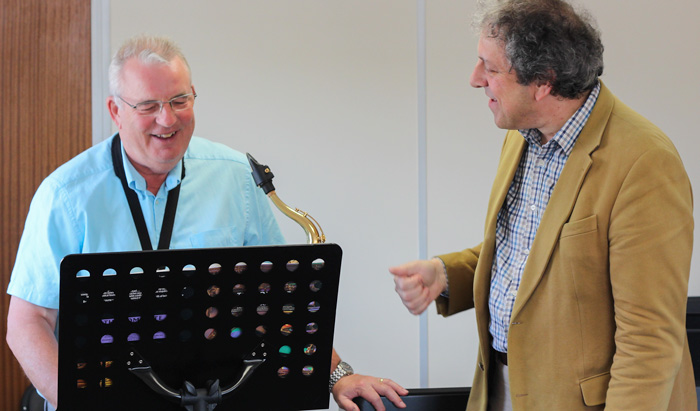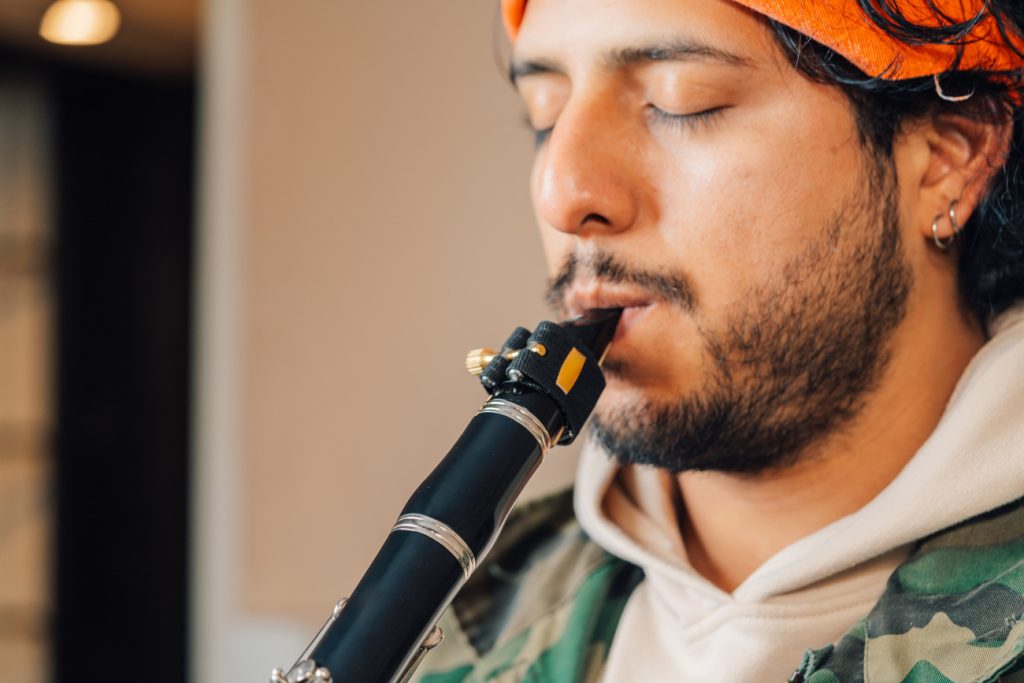Trying New Instruments
31st October 2019Whether you’re a student looking for a first upgrade or a professional on the market for something different, trying new – and second hand – instruments can be a difficult task. At least, if you don’t know what you’re looking for! We’ll give you a few pointers on things to focus on to get the most out of your trial sessions.

Before Testing
Even before you come along to try some instruments, it’s good to be prepared. Feeling ready helps you get into a good mind set.
- Call ahead to reserve instruments if you know what you want to try.
- We can reserve a few instruments for you, as well as booking you a space and time in a room here – such as our unique acoustic room. Even if you don’t know what models you want to try, let us know you’re coming and we’ll still be able to prepare for you.
- Bring a friend, family member, teacher or colleague.
- It’s great to have a second opinion on what you’re testing, as what you get back from an instrument is different to the audience’s perspective. Even if they aren’t so musical themselves, it’s still beneficial to have them there! A teacher, peer or more advanced musician is particularly useful as they’ll be able to offer advice from experience.
- Keep a budget in mind.
- Not only will you feel comfortable with the instruments you’re trying, but it helps us suggest other models at a similar price.
- If you can, it’s good to be a little bit flexible. The perfect flute may well be just £100 more than what you’re already trying! But also remain open to instruments that fall a fair bit under your budget.
- Bring your own mouthpieces, reeds, ligatures…
- If you come along with everything else you need to play, then the only variable will be the instrument itself. It’s easier to try instruments if you’re comfortable with everything else.
- Even better, bring your own instrument!
- Unless you’re a new beginner of course…! Otherwise, it’s best to have your instrument there as the ‘control’ instrument. On rare occasions, customers find that sticking to their current instrument is their best option.
- Bring some music you’re familiar with.
- Knowing how exercises, studies and pieces should go gives a great baseline when you’re looking at how the instrument performs.
Preparing In The Shop
- Think about what you want from the instrument.
- As you’re getting ready to play, have a think about what you’re expecting this new instrument to do. What genre(s) will you be playing? How often will you play it? Will in compliment your style? Does it go well with your existing set up?
- Don’t have too much in front of you at once!
- It can be a bit overwhelming to try new gear, especially if you’re testing an exhaustive list of instruments! We’ll be on hand to help you through. Usually we recommend having three instruments in at a time. Go through a ‘one out, one in’ elimination process – decide on your favourites of the three, then we’ll take the odd one out away and bring a new one through.
- Stay hydrated, happy and comfortable.
- Have a cup of tea, keep some water on hand, and don’t work too hard! It’s easy to over-do it when testing new instruments – make sure to have a bit of a rest if you’re feeling tired between instruments.
Testing The Instruments!
It already seems like a lot – but being ready in all the other senses makes everything else easier to manage!
- Warm up on your instrument first.
- Again, unless this is your first instrument! Warm up as you usually would before playing – be sure you’re ready to get going before you pick anything else up.
- Keep a tuner ready.
- We won’t be the only ones telling you how important intonation is! Do these new instruments make it easy to keep your tuning in the green?
- Is the instrument comfortable?
- This may seem somewhat obvious, but if the instrument feels awkward to hold or the ergonomics feel odd, it probably isn’t for you. Everyone’s bodies are different and will respond differently to a variety of models. The major priority when playing is to make sure your playing is as comfortable and healthy as possible.
- Don’t jump straight into pieces.
- Take the new instruments through their paces on your warm up. How are the long tones? Are scales easy to navigate?

When playing pieces, focus on…
Here are a few things you can look at when you’re trying a new instrument. Ask yourself these questions to help make your time easier and more enjoyable.
- Quality of tone.
- Do you like the sound you’re making? Is it suitable for what you play? Is the tone even and homogeneous across the range?
- Flexibility of tone colour.
- Can you change the character of your sound easily? Does it sing out in the way you want it to?
- Dynamics.
- Is the dynamic range wide enough? Can you control these dynamics at all registers of the instrument?
- Response and resistance.
- Is the instrument’s response quick and easy? Does the resistance, or ‘push back’, from the instrument suit you?
- Articulation.
- Is the staccato short and sharp? Are slurs across registers easy to execute?
- Range.
- Can you easily achieve the pitch range you want or require? Does it speak well in that range?
- Tuning and intonation.
- Is it in tune between wide intervals? Can you keep the instrument in tune at extreme dynamic or pitch ranges?
This may all seem a bit overwhelming, so remember that all our team members are here to help! If you have any questions about the instruments, we’re happy to pass on any information you need. What’s more, as we are all active musicians, we can help by offering advice and another opinion if you’re really struggling.
Visit our website to take a look at the new and second hand stock we offer. For more information, or to reserve instruments and a room to test in, email: sales@dawkes.co.uk / info@dawkes.co.uk, or give us a call on 01628 630800.